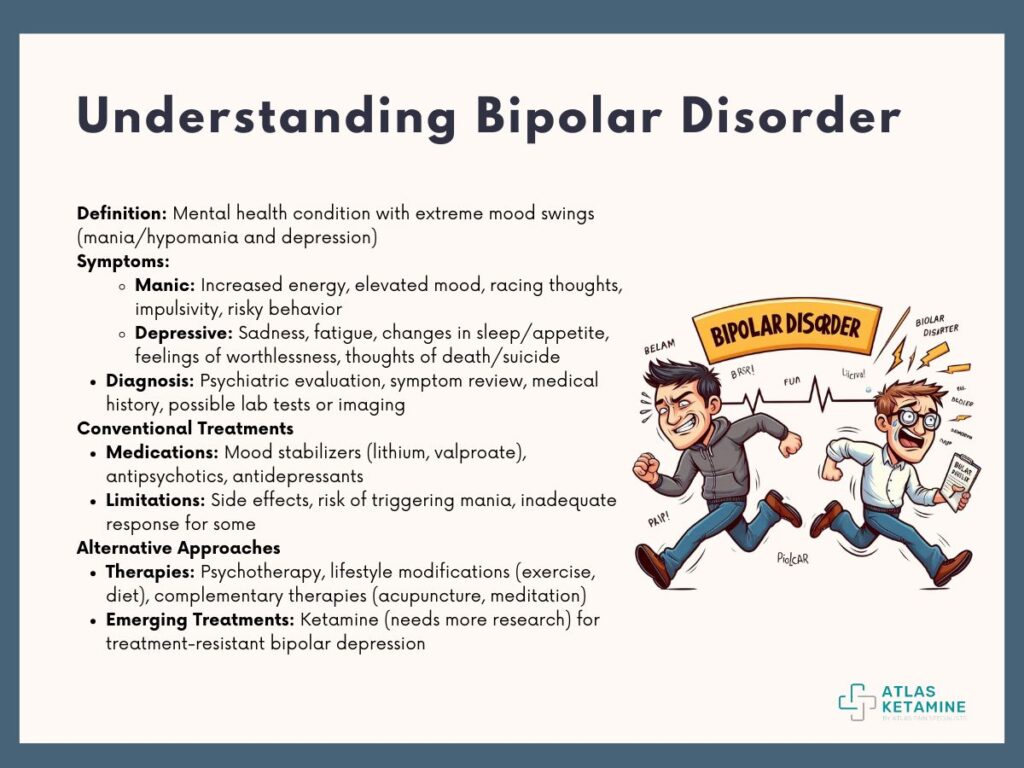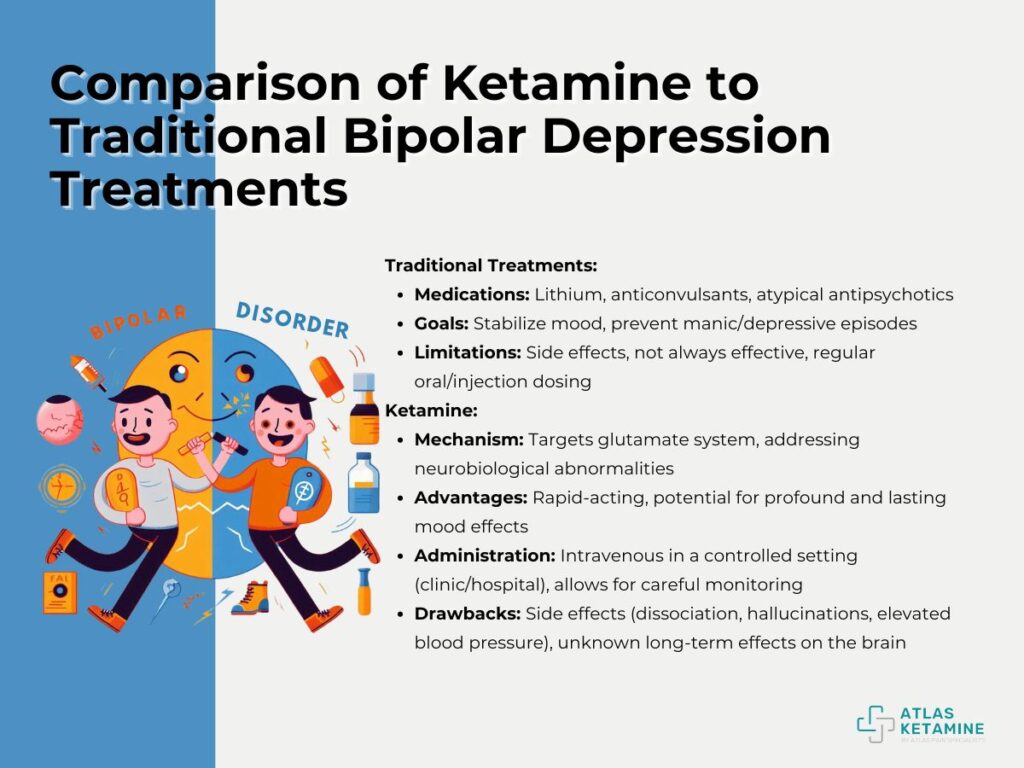Ketamine has emerged as a promising treatment for bipolar depression, offering rapid relief for many individuals who have not responded to traditional therapies. Its unique mechanism of action and ability to induce remission and reduce suicidal ideation make it a valuable addition to the treatment arsenal for bipolar disorder.
While ketamine does carry potential risks and side effects, careful monitoring and management can help mitigate these concerns. Encouraging patients and clinicians to explore this emerging therapeutic option can open up new possibilities for those struggling with bipolar depression. Let's look at ways of treating . Let's look at ways of treating bipolar depression with Ketamine.
Understanding Bipolar Disorder
Bipolar disorder is a mental health condition characterized by extreme mood swings that include emotional highs (mania or hypomania) and lows (depression). Individuals with bipolar disorder may experience intense periods of elevated mood, energy, and activity levels, followed by periods of sadness, hopelessness, and loss of interest or pleasure in most activities.

Symptoms and Diagnosis
Symptoms of bipolar disorder can vary widely and may include:
- Manic symptoms: Increased energy, elevated mood, racing thoughts, impulsivity, and risky behavior.
- Depressive symptoms: Sadness, fatigue, changes in sleep or appetite, feelings of worthlessness or guilt, and thoughts of death or suicide.
Diagnosis typically involves a thorough psychiatric evaluation, including a review of symptoms, medical history, and possibly lab tests or imaging studies to rule out other causes.
Conventional Treatments
Conventional treatments for bipolar depression often include mood stabilizers, such as lithium or valproate, to help manage mood swings and prevent episodes of mania or depression. Antipsychotic medications may also be used to control manic symptoms, while antidepressants may be prescribed for depressive episodes.
Limitations of Traditional Treatments and the Need for Alternatives
While conventional treatments can be effective for many individuals, they are not without limitations. Mood stabilizers and antipsychotics can have side effects, and antidepressants may trigger manic episodes in some people with bipolar disorder.
Some individuals may not respond adequately to these medications or may prefer alternative approaches.Alternative approaches to treating bipolar depression may include psychotherapy, lifestyle modifications (such as regular exercise and a healthy diet), and complementary therapies (such as acupuncture or meditation).
Some studies suggest that ketamine, a drug primarily used for anesthesia, may also be a promising alternative for treating bipolar depression, particularly for individuals who have not responded to other treatments. However, more research is needed to fully understand its effectiveness and safety for this purpose.
Mechanism of Action of Ketamine and Its Potential Benefits for Bipolar Depression
Ketamine, primarily known as an anesthetic agent, has gained attention for its potential in treating bipolar depression. Unlike traditional antidepressants, which target monoamine neurotransmitters like serotonin and norepinephrine, ketamine acts on the glutamate system.
Glutamate is the brain's primary excitatory neurotransmitter, involved in synaptic plasticity and mood regulation. Ketamine acts as an N-methyl-D-aspartate (NMDA) receptor antagonist, which leads to increased synaptic plasticity and the release of brain-derived neurotrophic factor (BDNF), promoting neuronal growth and connectivity.
This unique mechanism of action sets ketamine apart from conventional treatments for bipolar depression.One of the most significant advantages of ketamine is its rapid onset of action. While traditional antidepressants can take weeks to months to show effects, ketamine can often alleviate depressive symptoms within hours.
This rapid relief is crucial for individuals with bipolar depression, as it can help prevent the escalation of depressive episodes into more severe states.Moreover, ketamine has shown promise in treating treatment-resistant bipolar depression.
Many individuals with bipolar disorder do not respond adequately to traditional antidepressants, making ketamine a valuable alternative. Studies have demonstrated that ketamine can effectively reduce depressive symptoms in these individuals, offering hope where other treatments have failed.
Comparison of Ketamine to Traditional Bipolar Depression Treatments
When comparing ketamine to traditional treatments for bipolar depression, several key differences emerge.

- Traditional treatments, such as lithium, anticonvulsants, and atypical antipsychotics, aim to stabilize mood and prevent both manic and depressive episodes.While effective for many individuals, these medications often come with side effects and may not provide adequate relief for everyone.
- In contrast, ketamine's rapid-acting nature and unique mechanism of action offer a novel approach to treating bipolar depression. By targeting the glutamate system, ketamine may address underlying neurobiological abnormalities associated with bipolar disorder, potentially leading to more profound and lasting effects on mood.
- Another key difference is the administration method.Traditional bipolar depression treatments are typically taken orally or through injections and require regular dosing.
- Ketamine, on the other hand, is often administered intravenously in a controlled setting, such as a clinic or hospital. This method of administration allows for careful monitoring of the individual's response and ensures the safe delivery of the medication.However, it is essential to note that ketamine is not without its drawbacks.
Side effects, such as dissociation, hallucinations, and elevated blood pressure, can occur, particularly at higher doses. The long-term effects of ketamine on the brain are still not fully understood, raising concerns about its safety with prolonged use.
Ketamine Administration for Bipolar Depression
Ketamine, originally used as an anesthetic, has emerged as a potential breakthrough treatment for bipolar depression. Its unique mechanism of action, targeting the glutamate system rather than traditional monoamine neurotransmitters, sets it apart from conventional antidepressants.
Ketamine is administered for bipolar depression primarily through two methods: intravenous (IV) infusions and intranasal sprays.
Intravenous Ketamine Infusions
Intravenous (IV) ketamine infusions are a common and effective method of administering ketamine for bipolar depression. Here are key points regarding IV ketamine infusions:
- Mechanism of Action: IV ketamine acts as an NMDA receptor antagonist, leading to increased synaptic plasticity and the release of BDNF, which promotes neuronal growth and connectivity. This mechanism is different from traditional antidepressants, making ketamine a novel approach to treating bipolar depression.
- Effectiveness: IV ketamine infusions have been shown to have a rapid onset of action, often alleviating depressive symptoms within hours. This rapid relief is particularly beneficial for individuals in acute distress or those who have not responded to traditional treatments.
- Treatment Protocol: A typical treatment protocol involves a series of six infusions administered over a period of weeks. The frequency and dosage of infusions may vary based on the individual's response and severity of symptoms. Maintenance infusions may be recommended to sustain the treatment's benefits.
- Safety Considerations: While generally safe, IV ketamine infusions can have side effects such as dissociation, hallucinations, and changes in blood pressure and heart rate. Close monitoring during and after the infusion is essential to ensure safety.
Intranasal Ketamine Sprays
Intranasal ketamine sprays offer a convenient and less invasive method of administering ketamine for bipolar depression. Here are key points regarding intranasal ketamine sprays:
- Administration: Intranasal ketamine sprays are administered by spraying a ketamine solution into the nostrils. The medication is absorbed through the nasal mucosa and into the bloodstream, allowing for rapid delivery.
- Effectiveness: Like IV ketamine infusions, intranasal ketamine sprays have been shown to have a rapid onset of action, often providing relief within hours. This makes them a valuable option for individuals who prefer a non-invasive method of administration.
- Treatment Protocol: The dosing and frequency of intranasal ketamine sprays can vary depending on the formulation and individual response. Daily or intermittent dosing may be recommended, with a series of treatments over a period of weeks followed by maintenance doses as needed.
- Safety Considerations: Intranasal ketamine sprays are generally well-tolerated, with side effects similar to those of IV infusions. However, the risk of side effects may be lower with intranasal administration, as the medication is absorbed more gradually.
Dosing, Frequency, and Safety Considerations
The typical starting dose for IV ketamine infusions is 0.5 mg/kg, administered over a 40-minute period. For intranasal ketamine sprays, doses typically range from 0.25 mg/kg to 0.75 mg/kg, depending on the formulation and individual response.
The frequency of ketamine treatments can vary based on the individual's response and severity of symptoms. For both IV infusions and intranasal sprays, a series of treatments over a period of weeks is often recommended, followed by maintenance doses as needed.
Safety considerations for ketamine administration include monitoring for side effects during and after treatment. Close monitoring of blood pressure, heart rate, and mental status is essential to ensure safety. Individuals with a history of substance abuse or certain medical conditions may not be suitable candidates for ketamine treatment.
Efficacy of Ketamine in Bipolar Depression
Ketamine has shown significant efficacy in treating bipolar depression, offering rapid relief for many individuals. Studies indicate high response rates, with a substantial proportion experiencing remission.
Ketamine's ability to reduce suicidal ideation is particularly noteworthy, addressing a critical concern in bipolar depression treatment. While its duration of effects and long-term safety require further investigation, ketamine's unique mechanism of action and rapid onset make it a promising alternative for those who do not respond to conventional therapies.
Review of Clinical Studies and Research Findings
Numerous clinical studies have investigated the efficacy of ketamine in treating bipolar depression, with many showing promising results. Here, are some key findings from these studies:
Rates of Response
One of the most significant findings from clinical studies is the high rate of response to ketamine treatment in bipolar depression. Studies have shown that a significant proportion of individuals with bipolar depression experience a rapid and robust response to ketamine, often within hours of administration.This rapid response is particularly noteworthy, as traditional antidepressants can take weeks to show effects.
Rates of Remission
In addition to high response rates, studies have also reported high rates of remission with ketamine treatment. Remission refers to the complete resolution of depressive symptoms, allowing individuals to return to their baseline level of functioning.Ketamine has been shown to induce remission in a substantial number of individuals with bipolar depression, offering hope for those who have not responded to traditional treatments.
Antisuicidal Effects
Ketamine has also demonstrated significant antisuicidal effects in individuals with bipolar depression. Studies have shown that ketamine can rapidly reduce suicidal ideation and behavior, potentially saving lives in acute situations.
This effect is particularly crucial, as suicide risk is high in individuals with bipolar disorder, especially during depressive episodes.
Duration of Effects
While the rapid effects of ketamine are well-documented, questions remain about the duration of these effects. Some studies have suggested that the antidepressant effects of ketamine may be short-lived, lasting only a few days to weeks.
However, other studies have reported more sustained effects, with some individuals experiencing relief for several weeks to months after a single infusion.
Safety and Tolerability
Overall, ketamine has been found to be safe and well-tolerated in the majority of individuals with bipolar depression. Common side effects include dissociation, hallucinations, and changes in blood pressure and heart rate. However, these side effects are typically mild and transient, resolving shortly after the infusion.
Conclusion
Ketamine offers a promising alternative for individuals struggling with bipolar depression, providing rapid relief and high rates of response and remission. Despite potential risks and side effects, its unique mechanism of action and ability to reduce suicidal ideation make it a valuable option for those who have not responded to traditional treatments.
Encouraging patients and clinicians to explore this emerging therapeutic option could lead to improved outcomes and quality of life for individuals living with bipolar depression. Close monitoring and collaboration between healthcare providers and patients are essential to ensure safe and effective use of ketamine in this population.
